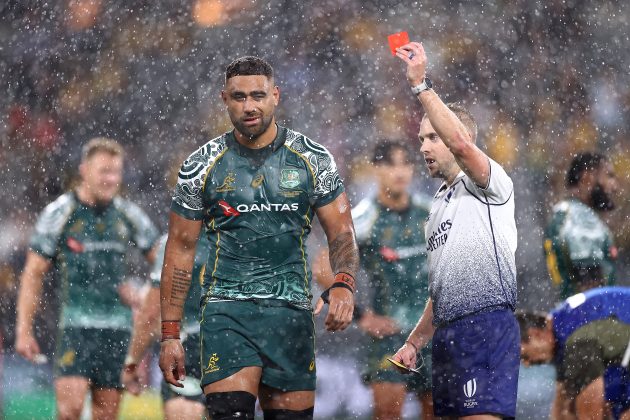Two writers argue this question. This debate first appeared in the February 2021 issue of Rugby World
Face-off: Do red cards ruin rugby as a spectacle?
LIAM NAPIER
New Zealand-based rugby journalist
RUGBY’S RED card sanction needs to change. It is too regimented and outdated. Everyone agrees safety must be paramount to counter concussion, and the head must be protected. But such a stance doesn’t have to come at the cost of a genuine, fair contest.
Rugby is complicated – rapid at Test level especially, requiring athletes to make split-second decisions in contact. At some point, there has to be common sense to recognise that dangerous collisions will, in some form, always happen because of the different shapes and sizes in our game.
How you treat complex, varied situations preserves the integrity of the contest.
Currently, red cards allow no differentiation between clear and obvious malicious intent or slightly-mistimed tackles that frequently occur.
Do red cards ruin games? Not always. Smart, fit teams can survive ten, 20 minutes at a push, with 14 men. Any longer and it’s beyond a fair
fight. Why not let red-carded players be replaced after, say, 20 minutes? The offender doesn’t return – they are cited, suspended if deemed necessary. And the contest is preserved.
Those who fork out to attend live events or pay subscription fees deserve better. At least be open to change instead of vehemently rejecting the notion that evolution may be needed.
Must we witness a Rugby World Cup final overshadowed by a debatable, early red that makes a mockery of the showpiece before the matter is properly addressed?

Seeing red: Andre Esterbuizen of Harlequins is sent off (Getty Images)
NEIL TREACY
Producer and broadcaster at Off the Ball
WHEN IT comes to protecting players from unnecessary and dangerous blows to the head, the game’s lawmakers cannot afford to make any concessions to the current way of policing.
Alternatives to a red card have been flown like kites ever since World Rugby started to take head shots seriously. The idea of an ‘orange card’ (20-odd minutes on the naughty step) is neither one thing or the other. It’s acknowledging something bad has happened without having the minerals to fully act on it.
Putting the incident ‘on report’ like in rugby league is an even greater cop-out. It’s not right that a player could commit an offence worthy of a six- or eight-week suspension, but carry on for the rest of the game in order to protect ‘the spectacle’. Hey, why ruin a good day out just because of potential brain damage?
In modern rugby, red cards exist to protect players just as much as they exist to punish. Removing them or tweaking them makes players less accountable for their actions, and if players are less accountable for their actions, they’re more likely to offend again.
And arguably most importantly, by making new concessions to their well-documented framework, World Rugby would be admitting defeat in their fight to make rugby safer.
Please beware: If we remove red cards in order to protect individual games of rugby, there may not be too much rugby left to protect.
What do you think? Email your views to rugbyworldletters@futurenet.com
This debate first appeared in the February 2021 issue of Rugby World.





